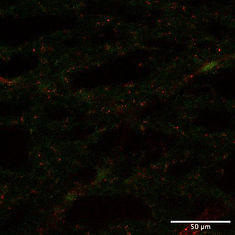Research Projects
Mapping molecular and cellular tissue architecture
Neurodevelopmental disorders are identified by clinical traits and, increasingly, by their genetic cause. Yet, the biological mechanisms behind many of these disorders remain poorly understood. This limitation hampers our capacity to devise targeted therapies that could enhance functionality beyond merely alleviating symptoms.
We continue to characterize the molecular and cellular architecture of primary human healthy and pathological tissues with spatial and temporal specificity. These data offer a framework for understanding the connections between candidate genes and diseases. They also act as a reference point for assessing in vitro models and investigating the biological mechanisms behind the clinical, molecular, and cellular characteristics of neurodevelopmental disorders.
Neurovascular regulation in neurodevelopmental disorders
Developmental brain anomalies are often assumed to be due to direct effects on neurons. However, we have identified mutations in genes with critical functions in the neurovascular unit in pediatric patients with neurological disease. Our exome sequencing analysis of patients with structural cerebellar abnormalities found that cerebellar malformations are features of rare, single gene neurodevelopmental disorders, confirmed a major contribution for non-genetic prenatal risk factors in their etiology, and found that the expression of cerebellar malformation genes is concentrated in limited cell types of the developing human cerebellum, including neuronal progenitors and endothelial cells.
We are using high-content imaging to visualize the microvascular network in primary tissue and introducing patient-derived variants into iPSCs to investigate the differential contributions of rare gene variants to neuronal and vascular development of the cerebellum.
Preclinical development for precision therapeutics of developmental epileptic encephalopathies
Microtubule-associated serine/threonine kinases (MAST) are large enzymes that share a domain of unknown function (DUF1908), a serine-threonine kinase (STK) domain, and a postsynaptic density protein-95/discs large/zona occludens-1 domain (PDZ). Several of the MAST family members are newly recognized as developmental brain disorder genes, but little is known about these genes’ properties and functions.
Our research focuses on deciphering the role of MAST4 in brain development, the impact of MAST4 mutations to the developing brain, defining the MAST4 interactome, and model development for preclinical research.


Image credit: Jonathan Gruberg
